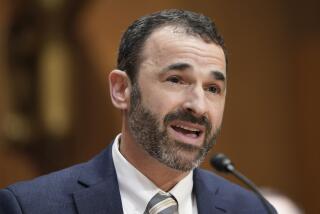Federal money flows to spy agencies to help them track terrorists and stop other attacks
- Share via
“Today, the year 2002, I have more spies stealing more secrets than at any time in the history of the CIA,” Jim Pavitt, head of the agency’s clandestine service, told an audience in April.
Pavitt’s comment reflects the fact that, while blamed for not preventing Sept. 11, the intelligence community has been lavished with additional resources to stop attacks.
The CIA’s budget swelled by more than $1 billion, the FBI’s by $745 million. The National Security Agency, the secret eyes and ears of the world, also got a hefty increase.
One result: June’s graduating class at “The Farm,” the CIA’s boot camp in Virginia, exceeded 100 officers, the largest since the Vietnam War. The CIA’s anti-terrorism center has tripled to about 1,200 people. The CIA has three times more Arabic speakers than it did three years ago.
The agency is also rebuilding in some areas that lost up to 25% of their staff members during the early-to mid-1990s, a time when the collapse of the Soviet Union led some to argue that intelligence agencies were no longer needed.
Similarly, the FBI is adding analysts, linguists and computer specialists.
Funds are likewise pouring into development of technologies, including sensors that might find and track chemical weapons and small-scale nuclear devices.
But most new hires are of European descent, not from the regions where terrorist threats originate. And many skeptics doubt that even Sept. 11 will force the agencies to share information, so long and deep is their history of not cooperating. A Senate aide puts it this way: “I think they tend to believe they’re being very cooperative--until something happens.”
More to Read
Sign up for Essential California
The most important California stories and recommendations in your inbox every morning.
You may occasionally receive promotional content from the Los Angeles Times.










